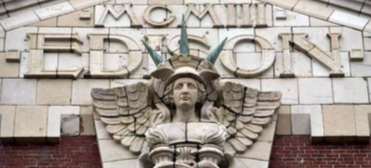Opposition to the Hilco/Redgate proposal to redevelop the former Edison Plant is mounting with the recent submission of over 1000 signatures garnered by South Boston residents, indicating widespread opposition to the proposal. The effort was led community activists, Joseph Cappuccio, a member of City Point Neighborhood Association and South Boston Committee on Open Space as well as Bernie O’Donnell of the South Boston Citizens Association and also a member of the South Boston Committee on Open Space. This latest submission was on top of the already hundreds of letters and emails in opposition from local residents submitted to the City over the course of public meeting process to date.
Organized labor, led by the MBTA Carmen’s Union Local 589 and the International Longshoremen’s Union, has opposed the proposal on the basis of its impact on transportation and job loss. Environment advocates are calling on the developers to release the specifics of the environmental impact studies that were conducted, which they have yet to do despite persistent requests. Elected officials have consistently opposed the size, scope and mix of uses on the site. “Bring the message to the people. That’s the best way to get the word out.”, said activist Bernie O’Donnell, who was soliciting signatures along with dozens of others over several days.
The signature drive was undertaken to raise awareness in the neighborhood beyond the obligatory public meetings that are not convenient for some and are too uncomfortable for others to comment openly during what is often a contentious civic climate. Many residents believe that there is an insignificant benefit to the greater South Boston neighborhood as a whole. It will be a “tourist attraction”, as one City Point resident stated at one of the public meetings.
Social Services agencies such as the South Boston Neighborhood Development Corporation (SBNDC), the Gavin Foundation and Julie’s Learning Center also weighed in expressing opposition to the proposal due to concerns about the project’s impact on housing affordability, income equality and other concerns. The South Boston Arts Association has been pushing for dedicated artist space as well.
It is clear from a review of the comments submitted during the public meeting and comment periods that the proponents have attempted to produce token support from vested interests, associates and new property owners through form letters and scripted emails.
Heading into the third year of this process, the BPDA is formulating their third scoping report, which is due in January. The developers will then have the opportunity to address the many questions, concerns and requests from the neighborhood residents and groups. If their record of responsiveness to date is an indicator, the concerns and likely opposition, will remain. The message that has become clearer by the moment is that the developer needs to come back to the community with a bona fide project alternative that addresses the impacts that South Boston will be living with long after they have exited the project.
On behalf of a weary community, Joseph Cappuccio stated, “This is a battle for our health, safety and quality of life.”











